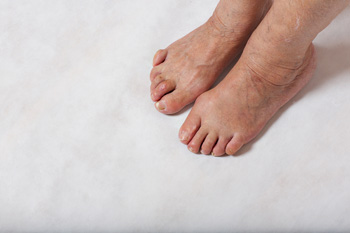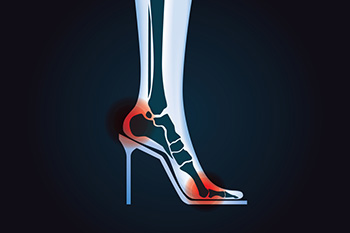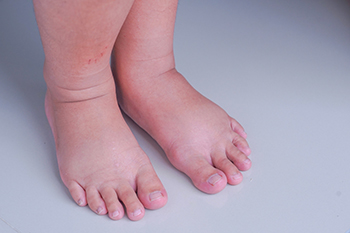(410) 764-7044
6506 Reisterstown Road, Baltimore
1205 York Road, Lutherville
6305 Belair Road, Baltimore
7809 Wise Avenue, Dundalk
March 2023
When a Hammertoe Causes Toe Pain

A hammertoe is a deformity that develops at the middle joint of a toe and causes the tip of the toe to turn down, resembling a hammer or claw. This generally happens in the foot's second toe when it is longer than the first toe or when the foot's arch is flat. Hammertoes can be caused by ill-fitting shoes that crowd the toes, genetics or a bunion that can overlap and crowd smaller toes. If the hammertoe remains in a bent position for a prolonged time, the tendons can tighten and shorten and remain this way even if shoes are not worn. A hammertoe can cause pain or discomfort when walking, and the skin can thicken on the toe causing corns or calluses to form. It can also be challenging to find shoes that fit well. If you have a hammertoe and it is causing you pain, it is suggested that you see a podiatrist for an evaluation and treatment.
Toe pain can disrupt your daily activities. If you have any concerns, contact one of our podiatrists of Plaza Podiatry. Our doctors can provide the care you need to keep you pain-free and on your feet.
What Causes Toe Pain?
Most severe toe pain is caused due to a sports injury, trauma from dropping something heavy on the toe, or bumping into something rigid. Other problems can develop over time for various reasons.
Toe pain can be caused by one or more ailments. The most common include:
- Trauma
- Sports injury
- Wearing shoes that are too tight
- Arthritis
- Gout
- Corns and calluses
- Hammertoe
- Bunions
- Blisters
- Ingrown toenails
- Sprains
- Fractures (broken bones)
- Dislocations
When to See a Podiatrist
- Severe pain
- Persistent pain that lasts more than a week
- Signs of infection
- Continued swelling
- Pain that prevents walking
Diagnosis
In many cases the cause of toe pain is obvious, but in others, a podiatrist may want to use more advanced methods to determine the problem. These can range from simple visual inspections and sensation tests to X-rays and MRI scans. Prior medical history, family medical history, and any recent physical traumatic events will all be taken into consideration for a proper diagnosis.
Treatment
Treatments for toe pain and injuries vary and may include shoe inserts, padding, taping, medicines, injections, and in some cases, surgery. If you believe that you have broken a toe, please see a podiatrist as soon as possible.
If you have any questions please feel free to contact our offices located in Baltimore, Lutherville, and Dundalk, MD . We offer the newest diagnostic tools and technology to treat your foot and ankle needs.
Foot Pain in Women Linked to High Heels

You may look great in those high heels or strappy sandals, but studies show that women who wear these types of shoes are at much higher risk of future heel and ankle pain. When you take a step, the foot absorbs a certain amount of shock from your body’s weight. Sneakers and other types of athletic shoes contain enough cushioning to handle the shock and protect the foot. However, this is generally not the case with women’s shoes, and for this reason women report heel and ankle pain in far larger numbers than do men. In fact, more than 60 percent of women who report hind foot pain have worn high heels and pumps at some point in their lives. Therefore, it is believed that past wearing of this type of shoe is a key factor in developing foot pain later in life. If you are having heel and ankle pain, it is suggested that you consult a podiatrist for guidance on proper footwear and other treatment options.
High heels have a history of causing foot and ankle problems. If you have any concerns about your feet or ankles, contact one of our podiatrists from Plaza Podiatry. Our doctors can provide the care you need to keep you pain-free and on your feet.
Effects of High Heels on the Feet
High heels are popular shoes among women because of their many styles and societal appeal. Despite this, high heels can still cause many health problems if worn too frequently.
Which Parts of My Body Will Be Affected by High Heels?
- Ankle Joints
- Achilles Tendon – May shorten and stiffen with prolonged wear
- Balls of the Feet
- Knees – Heels cause the knees to bend constantly, creating stress on them
- Back – They decrease the spine’s ability to absorb shock, which may lead to back pain. The vertebrae of the lower back may compress.
What Kinds of Foot Problems Can Develop from Wearing High Heels?
- Corns
- Calluses
- Hammertoe
- Bunions
- Morton’s Neuroma
- Plantar Fasciitis
How Can I Still Wear High Heels and Maintain Foot Health?
If you want to wear high heeled shoes, make sure that you are not wearing them every day, as this will help prevent long term physical problems. Try wearing thicker heels as opposed to stilettos to distribute weight more evenly across the feet. Always make sure you are wearing the proper shoes for the right occasion, such as sneakers for exercising. If you walk to work, try carrying your heels with you and changing into them once you arrive at work. Adding inserts to your heels can help cushion your feet and absorb shock. Full foot inserts or metatarsal pads are available.
If you have any questions please feel free to contact our offices located in Baltimore, Lutherville, and Dundalk, MD . We offer the newest diagnostic and treatment technologies for all your foot and ankle needs.
Why Are My Feet and Ankles Swollen?

The feet and ankles are likely areas where excess fluid in the body can accumulate. The medical term for this is called edema, and swelling of the feet is a common condition. This swelling can occur for various reasons, including obesity, eating foods that are salty, and taking certain medications. Additionally, many pregnant women suffer from swollen feet and ankles, and this is a normal part of pregnancy. Swollen feet may also happen due to an allergic reaction, such as an insect bite or sting, or from an ankle injury. It is possible that swollen feet can be reduced by limiting sodium intake, gently stretching and exercising, and frequently elevating the feet. It can be beneficial to sit for short periods of time with the feet elevated and to wear shoes that fit correctly. If you have swollen feet or ankles, it is suggested that you speak with a podiatrist who can determine what the reason is and provide treatment solutions.
Swollen feet can be a sign of an underlying condition. If you have any concerns, contact one of our podiatrists of Plaza Podiatry. Our doctors can provide the care you need to keep you pain-free and on your feet.
Swollen feet are a common ailment among pregnant women and people who stand or sit for extended periods. Aging may increase the possibility of swollen feet and patients who are obese often notice when their feet are swelling too. There may be medical reasons why swollen feet occur:
- Phlebitis - A condition that causes the veins to become inflamed and can also cause leg pain.
- Liver disease - This may lead to low blood levels of albumin which is a protein. This can cause fluid in the blood to pass into the tissues and several areas of the body can become swollen.
- Heart failure - When the heart doesn’t pump properly the blood that is normally pumped back to the heart can pool in the veins of the legs causing swollen feet.
- Kidney disease - One of the main functions of the kidneys is releasing excess fluid in the body. This type of condition can make it difficult for the kidneys to function properly, and as a result the feet may become swollen.
- Deep-vein thrombosis (DVT)- This is a serious condition where blood clots form in the veins of the legs. They can block the return of blood from the legs to the heart which may cause the feet to swell. It is important to be treated by a podiatrist if this condition is present.
Swollen feet can also be caused by bone and tendon conditions, including fractures, arthritis, and tendinitis. Additionally, there may be skin and toenail conditions and an infection may cause the feet to swell. Patients who take medicine to treat high blood pressure may be prone to getting swollen feet.
Many patients elevate their feet to help relieve the swelling and this is generally a temporary remedy. When a podiatrist is consulted the reason behind the swelling can be uncovered and subsequently treated.
If you have any questions please feel free to contact our offices located in Baltimore, Lutherville, and Dundalk, MD . We offer the newest diagnostic tools and technology to treat your foot and ankle needs.
It's Time for Beautiful Feet
How Pregnancy Impacts the Feet

Although a pregnant woman might not initially think that they should pay attention to the health of their feet during pregnancy, there are many reasons for her to monitor the health of her feet as she carries her baby to term. First, the woman’s feet may increase in size. Second, the pregnant woman could potentially experience changes to her skin. For example, many pregnant women might experience cracked heels, where the skin around the back of the heel becomes significantly dehydrated. It is important to note that if a pregnant woman experiences continuous itching on their feet, it is suggested that they schedule an appointment with a trusted medical professional like a podiatrist. If you are pregnant, you can schedule an appointment with a podiatrist today.
Pregnant women with swollen feet can be treated with a variety of different methods that are readily available. For more information about other cures for swollen feet during pregnancy, consult with one of our podiatrists from Plaza Podiatry. Our doctors will attend to all of your foot and ankle needs.
What Foot Problems Can Arise During Pregnancy?
One problem that can occur is overpronation, which occurs when the arch of the foot flattens and tends to roll inward. This can cause pain and discomfort in your heels while you’re walking or even just standing up, trying to support your baby.
Another problem is edema, or swelling in the extremities. This often affects the feet during pregnancy but tends to occur in the later stages.
How Can I Keep My Feet Healthy During Pregnancy?
- Wearing orthotics can provide extra support for the feet and help distribute weight evenly
- Minimize the amount of time spent walking barefoot
- Wear shoes with good arch support
- Wear shoes that allow for good circulation to the feet
- Elevate feet if you experience swelling
- Massage your feet
- Get regular, light exercise, such as walking, to promote blood circulation to the feet
If you have any questions please feel free to contact our offices located in Baltimore, Lutherville, and Dundalk, MD . We offer the newest diagnostic and treatment technologies for all your foot and ankle needs.





